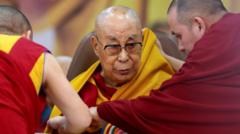As he nears his 90th birthday, the Dalai Lama is placing considerable focus on the future of Tibetan Buddhism and the governance of the exiled Tibetan community. The revered spiritual leader, who has guided countless followers out of Tibet amidst conflict with the Chinese government nearly seventy years ago, has indicated that he will soon unveil his approach to choosing a successor.
In light of ongoing oppression and attempts by Beijing to exercise control over Tibetan Buddhism, the Dalai Lama appears poised to disrupt traditional succession practices. This strategy seeks to mitigate any power vacuum that could be exploited by Chinese authorities as they continue to assert their dominance over Tibetan culture and religion.
Born Tenzin Gyatso, the 14th Dalai Lama hails from a farming family in what is now Qinghai Province, China, where he was recognized at just two years old as the reincarnation of the 13th Dalai Lama. Following the 1950 invasion of Tibet, he assumed political leadership at age 16, navigating his people through tumultuous times. His exile to India in 1959, during a Tibetan uprising, marked a significant turning point, leading him to establish a government-in-exile that works tirelessly for the preservation of Tibetan identity and autonomy.
The significance of the next Dalai Lama cannot be understated; as the spiritual leader suggests adopting innovative methods for determining his successor, the moves signal a critical turning point in Tibetan Buddhism's fight against external interference. How the Dalai Lama's successor is chosen will shape the future of Tibetan culture and its ongoing struggle against Chinese influence.



















